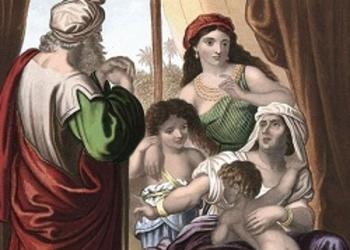The Blessings of Abraham - Part 3
Abraham's conflict between Isaac and Ishmael
Downloads
The Blessings of Abraham - Part 3: Abraham's conflict between Isaac and Ishmael

Ishmael was 13 years old when he was circumcised in the flesh of his foreskin. I remember quite a few things that happened to me when I was 13, but not something like this. Perhaps his ordeal was made easier because his dad and quite a few other mature males were circumcised that same day also (Genesis 17: 25-26).
Shortly after that separation ceremony, God explains to Abraham that he and Sarah will have their own son. They probably were not in much of a mood for celebration. In fact, it seems, their response is the original expression of irony and sarcasm. God as prototypical writer does not miss a trick. Who laughed more, Abraham or Sarah (Genesis 17:17, Genesis 18:12-13)?
Though the Bible does not say exactly, we believe that the original Hebrew indicates this particular miracle occurred about one year later with Abraham and Sarah having their part to play in the miracle. So, Sarah and Abraham have a son; all is well and the day is done. Sarah, however, did not enjoy the thought that Ishmael was looking to become the one inheritor of everything she and Abraham had accumulated. By this time, the promises had become sizeable and she and Abraham surely discussed the fullness of the incredible promises that lay seemingly forever on the horizon. The physical reality of two tents, two sons, but only one husband and patriarch caused her much concern.
Abraham’s inner conflict
We don’t see the conflict because God does not write a story like what we see today on television. The outcomes are much more important than the emotional seesaw that consumes our time and space before there is a resolution. God states clearly that which must occur before the next scene of His story. But understand, Abraham, Sarah, Hagar, Ishmael, and Isaac were people like you and me—just like we are. All are actors upon the stage of history, able to choose individually within the parameters of our given lines or scripts and free to choose how we will react in a given situation.
How did Abraham react when the Eternal told him to go to the land of Moriah and offer Isaac for a burnt offering? Did God ever intend for Abraham to sacrifice his son? I would say no. It is inconsistent with God, with God’s law, with what God wants us to do, and how God wants us to be.
Jesus Christ willingly allowed Himself to be executed by the Romans—capital punishment by the state and the Jewish leaders accepted transferable responsibility—because all this was within the written rules of God’s immutable law. However, human sacrifice was never countenanced within God’s law.
But right then, God wanted Abraham to make a choice. He wanted Abraham to ultimately choose Him, the Eternal, over even the most important physical thing or thought, desire, or design that Abraham had ever had. God wants us to make that same choice today.
Was this a test, a trial? You bet, but more than that, it was an archetypical example. What can we learn from Abraham? So much—as the first fruits of salvation we must understand the testing of Abraham, and we must submit to the same intensity even though we will each be tested in our own appropriate way. Our tests might be different, but they will also be very difficult.
What did Abraham think in detail? Perhaps he remembered Ishmael. He had loved him, watched him grow to become a capable young man of 13 and then apparently out of nowhere, came the voice of loving command telling him to heed the desire of Sarah his wife and send away Hagar and Ishmael. Why had God not accepted Ishmael and why sacrifice Isaac? We don’t know exactly, but it is eminently clear that Abraham obeyed.
A man of character
Abraham had character and knew he was not alone. He knew through experience that even though the meetings with God were few and far between, those encounters could occur at any time and usually portended another blessing.
This time the request was different.
Ever since Abram had journeyed away from Ur of the Chaldees, the voice had clearly distinguished between the pagan practices that were common in Babylon, and the fresh perspective that Abram was given as he journeyed west and then south. Human sacrifice was not common in Babylon but neither was it unheard of. Abraham must have considered that something extraordinary was about to occur.
It took two days of slow travel before Abraham, Isaac and their servants reached the land of Moriah. Once again, the Bible is sparse in its description of the internal agony that must have gripped Abraham as he told his two servants that he and Isaac would go alone to offer the sacrifice (Genesis 22:5).
Let us also consider the viewpoint of Isaac. Isaac noticed that there was no sacrificial animal, but easily accepted his father’s statement that God would provide.
We are not able to exactly understand this personal challenge to Abraham or to Isaac, but believing God’s Word and understanding that these actions were to become examples for all time is enough. Abraham and Isaac performed their functions well (Genesis 22:12). After Abraham’s test, God extends the promises with renewed vigor (Genesis 22:17-18).
When we think of Abraham, we usually consider all the incredible good things he did. He left civilization for a new distant home on the strength of a promise from an unknown God. He equipped and trained his men to the degree that they trusted Abram to pursue five kings and hassle them into submission and flight. He also impressed the king of Egypt with his possessions and entourage (which really must have been a gift from God) and then finally, to obediently journey to Moriah to sacrifice his son Isaac.
Abraham was like us
Do we ever consider that Abraham was human as we are and also like us?
Why did Abraham favor Isaac? He didn’t. He favored Ishmael. At Genesis 17:18, we can begin to glimpse that favor, but consider that Ishmael had been Abraham’s son for 13 years. Even if Sarah had treated Ishmael with contempt—she probably did considering Genesis 16:5-6—Abraham was strongly aware that Ishmael was his son.
When Abram became Abraham and Sarai became Sarah, greater promises were given. Why? These promises were given because God now knew Abraham was faithful (Genesis 22:12).
Abram/Abraham had an important part to play in the overall plan of God, but so do we. If we truly believe what we say we do, then each of God’s first fruits is essential to complete the purpose and plan of God. Each part of the body of Christ is necessary to be complete—capable of fulfilling each function throughout Eternity.
The essential parts of the life of Abraham have been told in this series but not all the lessons. One last part to Abraham’s life could be told. That part concerns all the lessons that the New Testament writers focused on to ensure that we, down through the ages, would not miss their importance.
The Blessings of Abraham - Part 1
The Blessings of Abraham - Part 2
The Blessings of Abraham - Part 3: Abraham's conflict between Isaac and Ishmael
